What is Mutation?
Mutation is a change in the DNA sequence of an organism. It can occur due to various factors such as errors during DNA replication, exposure to mutagenic agents (e.g. radiation, chemicals), or environmental factors.
Types of Mutations
There are several types of mutations:
- Point Mutation: A single nucleotide base is replaced with another, which can result in different amino acids being coded for in the protein synthesis process.
- Insertion: An extra nucleotide base is added into the DNA sequence.
- Deletion: A nucleotide base is removed from the DNA sequence.
- Frameshift Mutation: Insertion or deletion of nucleotides causes a shift in the reading frame, leading to a completely different protein being produced.
- Chromosomal Mutation: Involves changes in the structure or number of whole chromosomes, such as translocations, inversions, or duplications.
Effects of Mutation
Mutations can have various effects on an organism:
- Neutral: Some mutations have no discernible effect on the organism's phenotype.
- Beneficial: In rare cases, mutations can confer advantages such as resistance to diseases or environmental conditions.
- Deleterious: Many mutations are harmful and can lead to genetic disorders or diseases.
Importance of Mutations
Mutations are the raw material for evolution, providing genetic diversity upon which natural selection can act. They are also important in the fields of genetic research and biotechnology.
Study Guide
When studying mutations, it's important to understand the following key points:
- The different types of mutations and their specific effects on the DNA sequence.
- How mutations can lead to genetic diseases or disorders.
- The role of mutations in driving evolutionary change and adaptation.
- The impact of mutagenic agents on the frequency of mutations in populations.
- Applications of mutations in biotechnology and genetic engineering.
It's also helpful to practice analyzing and interpreting examples of mutations in DNA sequences, and understand the methods used to study and detect mutations.
[Mutation] Related Worksheets and Study Guides:
.◂Biology Worksheets and Study Guides High School. Genetics and heredity I
Worksheet/Answer key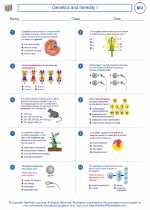 Genetics and heredity I
Genetics and heredity I  Worksheet/Answer key
Worksheet/Answer key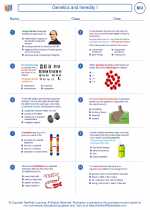 Genetics and heredity I
Genetics and heredity I  Worksheet/Answer key
Worksheet/Answer key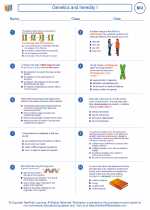 Genetics and heredity I
Genetics and heredity I  Worksheet/Answer key
Worksheet/Answer key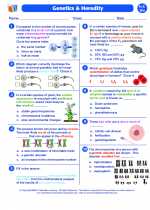 Genetics and heredity I
Genetics and heredity I  Vocabulary/Answer key
Vocabulary/Answer key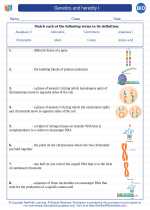 Genetics and heredity I
Genetics and heredity I  Vocabulary/Answer key
Vocabulary/Answer key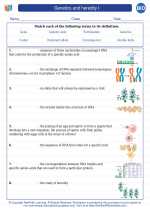 Genetics and heredity I
Genetics and heredity I  Vocabulary/Answer key
Vocabulary/Answer key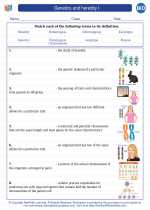 Genetics and heredity I
Genetics and heredity I  Vocabulary/Answer key
Vocabulary/Answer key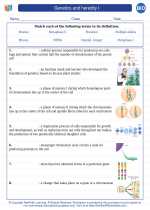 Genetics and heredity I
Genetics and heredity I  Vocabulary/Answer key
Vocabulary/Answer key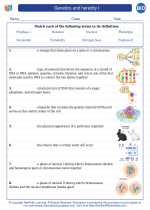 Genetics and heredity I
Genetics and heredity I  Vocabulary/Answer key
Vocabulary/Answer key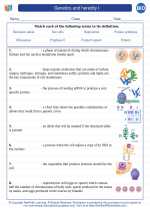 Genetics and heredity I
Genetics and heredity I  Vocabulary/Answer key
Vocabulary/Answer key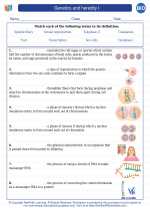 Genetics and heredity I
Genetics and heredity I 

 Worksheet/Answer key
Worksheet/Answer key
 Worksheet/Answer key
Worksheet/Answer key
 Worksheet/Answer key
Worksheet/Answer key
 Vocabulary/Answer key
Vocabulary/Answer key
 Vocabulary/Answer key
Vocabulary/Answer key
 Vocabulary/Answer key
Vocabulary/Answer key
 Vocabulary/Answer key
Vocabulary/Answer key
 Vocabulary/Answer key
Vocabulary/Answer key
 Vocabulary/Answer key
Vocabulary/Answer key
 Vocabulary/Answer key
Vocabulary/Answer key

The resources above cover the following skills:
LIFE SCIENCE (NGSS)
Heredity: Inheritance and Variation of Traits
Students who demonstrate understanding can:
Ask questions to clarify relationships about the role of DNA and chromosomes in coding the instructions for characteristic traits passed from parents to offspring.
Apply concepts of statistics and probability to explain the variation and distribution of expressed traits in a population.